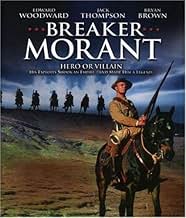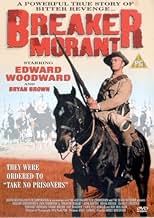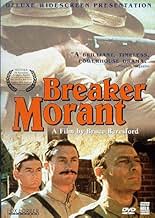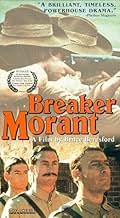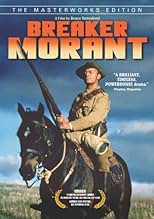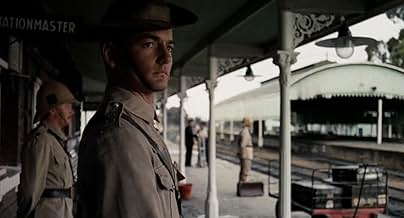ÉVALUATION IMDb
7,8/10
15 k
MA NOTE
Trois lieutenants australiens sont traduits en cour martiale pour avoir exécuté des prisonniers afin de détourner l'attention des crimes de guerre commis par leurs supérieurs.Trois lieutenants australiens sont traduits en cour martiale pour avoir exécuté des prisonniers afin de détourner l'attention des crimes de guerre commis par leurs supérieurs.Trois lieutenants australiens sont traduits en cour martiale pour avoir exécuté des prisonniers afin de détourner l'attention des crimes de guerre commis par leurs supérieurs.
- Nommé pour 1 oscar
- 13 victoires et 8 nominations au total
Charles 'Bud' Tingwell
- Lt. Col. Denny
- (as Charles Tingwell)
Histoire
Le saviez-vous
- Anecdotes"We shot them under Rule 303" is a reference to the.0.303 inch (7.7 millimetre) cartridge used in British Army rifles.
- GaffesIn the film, the defendants are allowed to gather in a common room until lights out to socialize and meet with their lawyer and other visitors. In reality, there were six defendants in total, including Captain Taylor, who were held in strict solitary confinement from their arrest through sentencing and were not allowed to communicate with each other at all.
- Citations
[last lines]
Harry Morant: Shoot straight, you bastards. - Don't make a mess of it!
- Générique farfeluIntroducing Lewis Fitz-Gerald as George Witton.
- Bandes originalesAt Last
Traditional tune
Arranged by Jack Grimsley (uncredited)
Lyrics by H.H. Morant
Performed by Edward Woodward
Commentaire en vedette
After first encountering "Breaker" Morant during a bout of insomnia in 1984 on cable, I have repeatedly come back to this film as one of my all-time classics--covering war, politics, tactics, transitions to manhood involved in all wars--and injustice.
Although set during the Boer War, the account of three officers tried for murder during a war in which the opponents were dressed as civilians has its obvious parallels to the 21st Century. It is absolutely amazing how similar a court marshal can be out on the "velt" of South Africa, in Washington, D.C., or during a purely uniformed war in which all protagonists are easily identifiable.
Three Australian volunteers for the "Bushvelt Carbineers", recruited to fight against civilian-clad commandos (reportedly the first use of the term), find themselves charged with murder, and set as an example by the British in order to prevent Germany from entering the war on the side of the Boer (Dutch) inhabitants of South Africa. In one incredulous encounter between a British officer and Lord Kitchener, the officer spouts the British line "they lack our altruism" (referring to German interests in the gold and silver mines of South Africa), to which Lord Kitchener grudgingly responds, "Quite." A sham trial from start to finish, the Australians are defended by military attorney with experience in "land conveyancing and wills" to which one of those charged, "the latter might come in handy." The film is replete with irony and tragicomic circumstances, as this "new war for a new century" presages many of the conflicts that would come later in the 20th century, and many of the clear paradoxes and trying aspects of the war against terror--again, in which one side is not uniformed, does not conduct war according to any known "rules" of "civilized warfare" (an oxymoron if ever there was one). It has lost none of its cutting edge in the 25-odd years since its release.
Although set during the Boer War, the account of three officers tried for murder during a war in which the opponents were dressed as civilians has its obvious parallels to the 21st Century. It is absolutely amazing how similar a court marshal can be out on the "velt" of South Africa, in Washington, D.C., or during a purely uniformed war in which all protagonists are easily identifiable.
Three Australian volunteers for the "Bushvelt Carbineers", recruited to fight against civilian-clad commandos (reportedly the first use of the term), find themselves charged with murder, and set as an example by the British in order to prevent Germany from entering the war on the side of the Boer (Dutch) inhabitants of South Africa. In one incredulous encounter between a British officer and Lord Kitchener, the officer spouts the British line "they lack our altruism" (referring to German interests in the gold and silver mines of South Africa), to which Lord Kitchener grudgingly responds, "Quite." A sham trial from start to finish, the Australians are defended by military attorney with experience in "land conveyancing and wills" to which one of those charged, "the latter might come in handy." The film is replete with irony and tragicomic circumstances, as this "new war for a new century" presages many of the conflicts that would come later in the 20th century, and many of the clear paradoxes and trying aspects of the war against terror--again, in which one side is not uniformed, does not conduct war according to any known "rules" of "civilized warfare" (an oxymoron if ever there was one). It has lost none of its cutting edge in the 25-odd years since its release.
- DoctorVic
- 1 mars 2005
- Lien permanent
Meilleurs choix
Connectez-vous pour évaluer et surveiller les recommandations personnalisées
- How long is Breaker Morant?Propulsé par Alexa
Détails
- Date de sortie
- Pays d’origine
- Site officiel
- Langues
- Aussi connu sous le nom de
- Héros ou salopards
- Lieux de tournage
- Cactus Farm, Burra, South Australia, Australie(deserted farmhouse, Boer attack)
- sociétés de production
- Consultez plus de crédits d'entreprise sur IMDbPro
Box-office
- Budget
- 800 000 $ AU (estimation)
- Brut – à l'échelle mondiale
- 948 $ US
Contribuer à cette page
Suggérer une modification ou ajouter du contenu manquant



